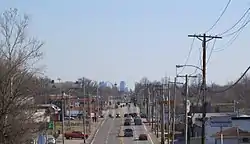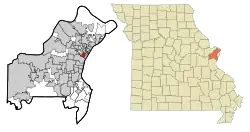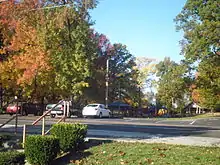Pagedale, Missouri
Pagedale is a city in St. Louis County, Missouri, United States. The population was 3,310 at the 2010 census.[6]
Pagedale, Missouri | |
|---|---|
 St. Charles Rock Road, Pagedale, Missouri, February 2013 | |
 Location within St. Louis County and Missouri | |
| Coordinates: 38°40′42″N 90°18′40″W | |
| Country | United States |
| State | Missouri |
| County | St. Louis |
| Area | |
| • Total | 1.20 sq mi (3.12 km2) |
| • Land | 1.20 sq mi (3.12 km2) |
| • Water | 0.00 sq mi (0.00 km2) |
| Elevation | 571 ft (174 m) |
| Population | |
| • Total | 3,310 |
| • Estimate (2019)[3] | 3,291 |
| • Density | 2,733.39/sq mi (1,055.59/km2) |
| Time zone | UTC-6 (Central (CST)) |
| • Summer (DST) | UTC-5 (CDT) |
| Area code | 314 |
| FIPS code | 29-55964 [4] |
| GNIS feature ID | 756495 [5] |

History
The area originally was farmland, but it did have an interesting history with several pockets of significant Greek and African-American residents. Because St. Vincent's mental hospital was located just north of St. Charles Rock Road, a streetcar line was constructed in the late 1800s from just south of Olive Street Road in University City north on the east side of Ferguson Avenue through what is now Pagedale to meet the electric interurban line to Saint Charles at the Rock Road. The south end of the line eventually joined with the Creve Coeur Lake streetcar line which ran on Vernon Avenue (but later was relocated a block further south to run behind a new subdivision). That transportation opened up the area to housing.
South of Pagedale, at Page and Ferguson, was Hazel Hill, which eventually became the reason for the Lincoln School which became part of the Normandy School District. Though long forgotten as a name, the Hazel Hill community still exists and the Lincoln building is still standing. When Pagedale was incorporated, the northern end went beyond the Rock Road up Hoke Avenue, which later was renamed Ferguson though it didn't line up with Ferguson. In 1954 a new housing subdivision was built at Ferguson and North Market Street. That subdivision, named Engelholm Gardens, a long forgotten name also, still stands, looking exactly as it did in 1954.[7]
In 2001, a new $1 million Pagedale City Hall and Police Facility was built. It included an 8,000-square-foot space to house a local court facility.[8]
In November 2015, some residents filed a civil rights class action lawsuit against the city of Pagedale for overly aggressive ticketing of residential code enforcement as a "revenue generating machine".[9][10][11][12]
Geography
According to the United States Census Bureau, the city has a total area of 1.19 square miles (3.08 km2), all land.[13][14]
Demographics
| Historical population | |||
|---|---|---|---|
| Census | Pop. | %± | |
| 1950 | 3,866 | — | |
| 1960 | 5,106 | 32.1% | |
| 1970 | 5,044 | −1.2% | |
| 1980 | 4,590 | −9.0% | |
| 1990 | 3,771 | −17.8% | |
| 2000 | 3,616 | −4.1% | |
| 2010 | 3,310 | −8.5% | |
| 2019 (est.) | 3,291 | [3] | −0.6% |
| U.S. Decennial Census[15] | |||
2010 census
As of the census[2] of 2010, there were 3,304 people, 1,179 households, and 829 families living in the city. The population density was 2,776.5 inhabitants per square mile (1,072.0/km2). There were 1,461 housing units at an average density of 1,227.7 per square mile (474.0/km2). The racial makeup of the city was 3.4% White, 93.4% African American, 0.2% Native American, 0.2% Asian, 0.6% from other races, and 2.2% from two or more races. Hispanic or Latino of any race were 1.4% of the population.
There were 1,179 households, of which 39.0% had children under the age of 18 living with them, 22.5% were married couples living together, 39.9% had a female householder with no husband present, 7.9% had a male householder with no wife present, and 29.7% were non-families. 25.4% of all households were made up of individuals, and 10.5% had someone living alone who was 65 years of age or older. The average household size was 2.79 and the average family size was 3.33.
The median age in the city was 32.7 years. 30.6% of residents were under the age of 18; 9.9% were between the ages of 18 and 24; 24.3% were from 25 to 44; 23.4% were from 45 to 64; and 11.7% were 65 years of age or older. The gender makeup of the city was 46.1% male and 53.9% female.
2000 census
As of the census[4] of 2000, there were 3,616 people, 1,213 households, and 891 families living in the city. The population density was 3,003.8 people per square mile (1,163.5/km2). There were 1,408 housing units at an average density of 1,169.6 per square mile (453.0/km2). The racial makeup of the city was 5.67% White, 92.09% African American, 0.30% Native American, 0.22% Asian, 0.28% from other races, and 1.44% from two or more races. Hispanic or Latino of any race were 1.00% of the population.
There were 1,213 households, out of which 33.7% had children under the age of 18 living with them, 28.4% were married couples living together, 39.0% had a female householder with no husband present, and 26.5% were non-families. 22.3% of all households were made up of individuals, and 7.3% had someone living alone who was 65 years of age or older. The average household size was 2.89 and the average family size was 3.40.
In the city, the population was spread out, with 31.2% under the age of 18, 9.6% from 18 to 24, 24.3% from 25 to 44, 22.7% from 45 to 64, and 12.1% who were 65 years of age or older. The median age was 34 years. For every 100 females, there were 83.3 males. For every 100 females age 18 and over, there were 76.6 males.
The median income for a household in the city was $23,873, and the median income for a family was $25,917. Males had a median income of $31,875 versus $24,423 for females. The per capita income for the city was $11,005. About 25.7% of families and 29.5% of the population were below the poverty line, including 38.5% of those under age 18 and 29.6% of those age 65 or over.
References
- "2019 U.S. Gazetteer Files". United States Census Bureau. Retrieved July 26, 2020.
- "U.S. Census website". United States Census Bureau. Retrieved 2012-07-08.
- "Population and Housing Unit Estimates". United States Census Bureau. May 24, 2020. Retrieved May 27, 2020.
- "U.S. Census website". United States Census Bureau. Retrieved 2008-01-31.
- "US Board on Geographic Names". United States Geological Survey. 2007-10-25. Retrieved 2008-01-31.
- "Race, Hispanic or Latino, Age, and Housing Occupancy: 2010 Census Redistricting Data (Public Law 94-171) Summary File (QT-PL), Pagedale city, Missouri". United States Census Bureau. Retrieved October 24, 2011.
- Wayne Brasler, Normandy area historian, whose family was one of those who bought the new houses at Engleholm Gardens
- Pagedale Municipal Center; Kwame Building Group; 2001.
- Lawsuit; United States District Court; November 4, 2015.
- Lawsuit Accuses Missouri City of Fining Homeowners to Raise Revenue; New York Times; November 4, 2015.
- City’s ‘nitpicky’ fines for tree stumps, blinds trigger civil rights lawsuit; Fox News; December 28, 2015
- Nanny State of the Week: City fines residents for chipped paint, mismatched curtains; Missouri Watchdog; December 21, 2015
- "US Gazetteer files 2010". United States Census Bureau. Archived from the original on 2012-01-25. Retrieved 2012-07-08.
- "US Gazetteer files: 2010, 2000, and 1990". United States Census Bureau. 2011-02-12. Retrieved 2011-04-23.
- "Census of Population and Housing". Census.gov. Retrieved June 4, 2015.
